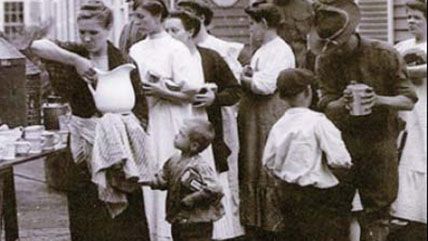Disaster Progressivism

Spontaneous cooperation, not social chaos, is the norm after a natural or technological disaster. That fact looms large in Jacob Remes' Disaster Citizenship (University of Illinois Press), a book that looks at two devastating events—a 1914 fire in Salem, Massachusetts, and a 1917 shipyard explosion in Halifax, Nova Scotia—and shows what happened when that grassroots mutual aid ran headfirst into the Progressive Era's passion for rule by "expert" professionals.
Remes examines everything from ethnic networks to labor politics to the battle for control of government aid. (The people of Salem and Halifax were often happy to take the help, but only on their own terms.) As an undergrad at Yale, Remes took a class from Seeing Like a State author James C. Scott, and a very Scottian theme runs through all of the book's nuances and distinctions: the clash between an "organic, emergent order" and a power structure for whom that order was "inherently illegible and unknowable."
This article originally appeared in print under the headline "Disaster Progressivism."


Hide Comments (0)
Editor's Note: As of February 29, 2024, commenting privileges on reason.com posts are limited to Reason Plus subscribers. Past commenters are grandfathered in for a temporary period. Subscribe here to preserve your ability to comment. Your Reason Plus subscription also gives you an ad-free version of reason.com, along with full access to the digital edition and archives of Reason magazine. We request that comments be civil and on-topic. We do not moderate or assume any responsibility for comments, which are owned by the readers who post them. Comments do not represent the views of reason.com or Reason Foundation. We reserve the right to delete any comment and ban commenters for any reason at any time. Comments may only be edited within 5 minutes of posting. Report abuses.
Please to post comments
Mute this user?
Ban this user?
Un-ban this user?
Nuke this user?
Un-nuke this user?
Flag this comment?
Un-flag this comment?